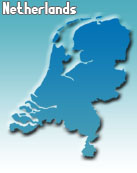Dutch to develop new European climate satellite
 The Hague - The Netherlands is to develop Europe's next climate satellite, it was announced by the European Space Agency (ESA) at the close of the agency's tri-annual conference in The Hague on Wednesday.
The Hague - The Netherlands is to develop Europe's next climate satellite, it was announced by the European Space Agency (ESA) at the close of the agency's tri-annual conference in The Hague on Wednesday.
Dutch Economics Minister Maria van der Hoeven had been lobbying for collective European financing of a new climate satellite.
The Dutch government has reserved 78 million euros (101 million dollars) to finance the 115- to 130-million-euro Tropospheric Ozone- Monitoring Instrument, or Tropomi.
The Tropomi is developed by the Dutch Royal Meteorological Institute KNMI, Dutch Space, the governmental technology research institute, TNO and the Dutch Aerospace Research Institute NIVR.
The 18 European ministers participating in Wednesday's conference said the new satellite would be launched in 2014.
"The data provided by the Tropomi will enable the Dutch Royal Meteorological Institute to provide accurate data about smog," van der Hoeven said.
The Tropomi is a measuring instrument for ozone in the troposphere, the lowest part of the atmosphere containing 80 per cent of the world's air.
The Tropomi would be the successor of similar measuring instruments - the Gome, Omi and Sciamachy - that are already providing information about carbon dioxide emissions and other forms of air pollution in the atmosphere.
"This camera can see through each cloud," said Nico van der Putten, manager of the Dutch Aerospace Research Institute NIVR.
He referred to the fact the new satellite incorporates the unique characteristics of all its predecessors but has many improvements, including a wide lens that can take images in an unusually broad spectrum.
The images also have a much higher resolution than before. With its improved technology, Tropomi is expected to provide further understanding of the causes of climate change and air pollution.
The launch of the new satellite is part of a larger ESA project that involves the continuous monitoring of the earth at a total cost of 857 million euros.
The European ministers also discussed the International Space Station (ISS) research of the planet Mars and various projects concerning navigation systems.
The total costs of Europe's space projects in the next five years are now projected to amount to 10 billion euros, several hundred million euros more than estimated at the previous ESA conference in Berlin.
"Investing money in long-term space projects is an appropriate answer to the economic crisis," French Education Minister Valerie Pecresse said.
Explaining the substantial size of the Dutch contribution to ESA's projects, van der Hoeven said The Hague wanted Dutch astronaut Andre Kuipers to participate in a European space mission no later than 2011.
In 2004, Kuipers was the first Dutch astronaut to board the ISS, on which he spent 10 days.
Van der Hoeven said that at Kuipers' next mission, he should be able to stay on board the ISS for six months. (dpa)